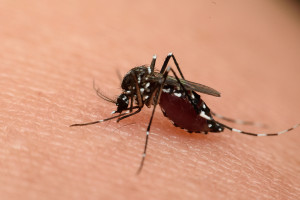What Is the Zika Virus?
 The Zika virus is an infection that is primarily spread through the bite of an infected Aedes (“unpleasant”) mosquito. Previously found only in tropical and subtropical zones, Aedes mosquitoes have recently been discovered on all continents except Antarctica.
The Zika virus is an infection that is primarily spread through the bite of an infected Aedes (“unpleasant”) mosquito. Previously found only in tropical and subtropical zones, Aedes mosquitoes have recently been discovered on all continents except Antarctica.
Experts believe that the time between exposure to Zika and the onset of its symptoms (incubation period) is one to two days. The most common symptoms include low-grade fever, skin rashes, joint and muscle pain, headaches, and conjunctivitis (pink eye). Because the symptoms are typically mild and last only two to seven days, hospitalization is rarely necessary; in fact, many people do not even realize that they have an infection. Infected individuals are generally advised to rest and drink plenty of fluids.
Research is ongoing, and some preliminary findings suggest that Zika may be linked to neurological issues, such as Guillain-Barre syndrome (GBS) and acute disseminated encephalomyelitis (ADEM), which is similar to multiple sclerosis. Additionally, a major concern about Zika is its potential to spread from a pregnant woman to her fetus. An infection during pregnancy can lead to serious birth defects, such as microcephaly. This condition can inhibit a baby’s brain development, as evidenced by a smaller-than-average head size. Severe microcephaly can lead to developmental delays, intellectual disabilities, seizures, balance and mobility issues, hearing and vision impairments, and other lifelong problems.
Currently, there is no vaccine available to help prevent Zika, and there is still much to be learned about the infection. Therefore, the most effective preventive measure is to avoid mosquito bites, and everyone is advised to do so. Here are some ways to protect yourself:
- Avoid unnecessary travel to areas where Zika is known to be spreading (consult the Centers for Disease Control and Protection (CDC) Travelers’ Health site for the most up-to-date information).
- Use Environmental Protection Agency (EPA)-registered insect repellents, which are proven to be safe and effective, even for pregnant women.
- When outdoors, wear protective clothing, including pants, a long-sleeved shirt, and closed footwear (Aedes mosquitoes are very aggressive and known to bite both during the day and at night).
- When indoors, use air conditioning or window and door screens to help keep mosquitoes outside.
- Remove or stay away from mosquito breeding sites, such as containers of standing water.
- Ask a health care provider for personalized guidance, especially if you are or may become pregnant, or if you must travel to a high-risk area.
There is also some evidence to suggest that Zika may be transmitted by infected men during sexual intercourse; however, the specifics are not yet well understood and the risk level remains unclear. For these reasons, the CDC recommends condom use during sexual activity, particularly if a male partner may have been exposed to Zika.
If you have questions about Zika, you are welcome to speak with a health care professional at South Tampa Immediate Care. Our walk-in clinic is conveniently located at 602 S. Howard Ave. in Tampa, FL, and no appointments are necessary.













